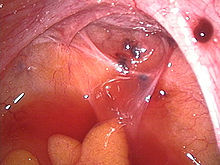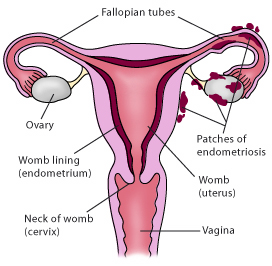What is endometriosis?
Endometriosis (say “en-doh-mee-tree-OH-sus”) is a problem many women have during their childbearing years. It means that a type of tissue that lines your uterus is also growing outside your uterus. This does not always cause symptoms. And it usually isn’t dangerous. But it can cause pain and other problems.
The clumps of tissue that grow outside your uterus are called implants. They usually grow on the ovaries, the fallopian tubes, the outer wall of the uterus, the intestines, or other organs in the belly. In rare cases they spread to areas beyond the belly.
How does endometriosis cause problems?
Your uterus is lined with a type of tissue called endometrium (say “en-doh-MEE-tree-um”). Each month, your body releases hormones that cause the endometrium to thicken and get ready for an egg. If you get pregnant, the fertilized egg attaches to the endometrium and starts to grow. If you do not get pregnant, the endometrium breaks down, and your body sheds it as blood. This is your menstrual period.
When you have endometriosis, the implants of tissue outside your uterus act just like the tissue lining your uterus. During your menstrual cycle, they get thicker, then break down and bleed. But the implants are outside your uterus, so the blood cannot flow out of your body. The implants can get irritated and painful. Sometimes they form scar tissue or fluid-filled sacs (cysts). Scar tissue may make it hard to get pregnant.
What causes endometriosis?
Experts don’t know what causes endometrial tissue to grow outside your uterus. But they do know that the female hormone estrogen makes the problem worse. Women have high levels of estrogen during their childbearing years. It is during these years-usually from their teens into their 40s-that women have endometriosis. Estrogen levels drop when menstrual periods stop (menopause). Symptoms usually go away then.
What are the symptoms?
The most common symptoms are:
- Pain. Where it hurts depends on where the implants are growing. You may have pain in your lower belly, your rectum or vagina, or your lower back. You may have pain only before and during your periods or all the time. Some women have more pain during sex, when they have a bowel movement, or when their ovaries release an egg (ovulation).
- Abnormal bleeding. Some women have heavy periods, spotting or bleeding between periods, bleeding after sex, or blood in their urine or stool.
- Trouble getting pregnant (infertility). This is the only symptom some women have.
Endometriosis varies from woman to woman. Some women don’t know that they have it until they go to see a doctor because they can’t get pregnant or have a procedure for another problem. Some have mild cramping that they think is normal for them. In other women, the pain and bleeding are so bad that they aren’t able to work or go to school.
How is endometriosis diagnosed?
Many different problems can cause painful or heavy periods. To find out if you have endometriosis, your doctor will:
- Ask questions about your symptoms, your periods, your past health, and your family history. Endometriosis sometimes runs in families.
- Do a pelvic exam. This may include checking both your vagina and rectum.
If it seems like you have endometriosis, your doctor may suggest that you try medicine for a few months. If you get better using medicine, you probably have endometriosis.
To find out if you have a cyst on an ovary, you might have an imaging test like an ultrasound, an MRI, or a CT scan. These tests show pictures of what is inside your belly.
The only way to be sure you have endometriosis is to have a type of surgery called laparoscopy (say “lap-uh-ROSS-kuh-pee”). During this surgery, the doctor puts a thin, lighted tube through a small cut in your belly. This lets the doctor see what is inside your belly. If the doctor finds implants, scar tissue, or cysts, he or she can remove them during the same surgery.
How is it treated?
There is no cure for endometriosis, but there are good treatments. You may need to try several treatments to find what works best for you. With any treatment, there is a chance that your symptoms could come back.
Treatment choices depend on whether you want to control pain or you want to get pregnant. For pain and bleeding, you can try medicines or surgery. If you want to get pregnant, you may need surgery to remove the implants.
Treatments for endometriosis include:
- Over-the-counter pain medicines like ibuprofen (such as Advil or Motrin) or naproxen (such as Aleve). These medicines are called anti-inflammatory drugs, or NSAIDs. They can reduce bleeding and pain.
- Birth control pills. They are the best treatment to control pain and shrink implants. Most women can use them safely for years. But you cannot use them if you want to get pregnant.
- Hormone therapy. This stops your periods and shrinks implants. But it can cause side effects, and pain may come back after treatment ends. Like birth control pills, hormone therapy will keep you from getting pregnant.
Follow on Twitter @myklluli





Oluseun, PH
March 29, 2013 at 6:48 am
Wow! What a great write up. Thanks! But seriously women get a lot of problem o! Lol. Endometriosis again, Ahhh! Na wa o
LikeLike
Jeremiah
March 28, 2013 at 3:50 pm
Wow! This interesting and could this be the reason why my girl use to complain of so much pain (serious one o!) whenever she’s on her period, it’s always so terrible and crazy that I use to run away from her. I will share this with her and hope it helps cos I don’t think I can continue to watch her go through that madness all through my life.
Thanks Myklluli {yes}
LikeLike
Temi
March 28, 2013 at 2:36 pm
Wow,thanks for the post,..you are great
LikeLike
Anonymous
March 28, 2013 at 2:35 pm
Wow, thanks for the post..you are great
LikeLike
Kels
March 27, 2013 at 2:43 pm
God Bless you
LikeLike
Ronke
March 27, 2013 at 2:09 pm
Thanks
LikeLike
Adaeze
March 27, 2013 at 2:08 pm
Hmm! Thanks for the post. good one
LikeLike
Anonymous
April 26, 2014 at 5:37 pm
l iove you
LikeLike